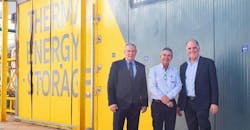Biomass-fueled Thermal Energy Storage creating Heat for Plastic Manufacturing plant in Brazil
Biomass-fueled power is now heating crushed rock to create thermal energy storage creating industrial heat at a Brazilian plastics manufacturing plant.
Brenmiller Energy is working with water storage solutions firm Fortlev to suppl a 1-MWh bGen thermal energy storage unit at the latter’s production facility in Anapolis, Brazil. The bGen can use numerous resources, and the unit installed for Fortlev uses renewable biomass, rather than methane natural gas, to generate extremely hot air (more than 600 degrees Celsius) used in making polyethylene plastic water tanks with rotational moulding machines.
The two companies say this is first use of TESS powered by renewables for commercial operation in South America. The project is now inspiring plans to expand deployment of Brenmiller’s solution to another Fortlev manufacturing plant in Brazil sometime in 2023.
Related stories
Biomass-fueled Brazilian Pulp Mill connecting to the Grid
WELTEC commissions 450-kW Biomass Cogeneration plant in Japan
Substituting biomass for methane gas should lower Fortlev’s fuel costs associated with heating this air by more than 75 percent, the companies say. It also could avoid 800 metric tons of greenhouse gas emissions annually.
“Fortlev is dedicated to delivering its customers high-quality, competitively price water storage solutions while respecting the environment,” Antonio Torres, Fortlev Solar CEO, said in a statement. “By helping Fortlev lower our fuel expenses and decarbonize one of our thermal manufacturing processes, Brenmiller Energy’s bGen technology is helping us realize this goal and do well while doing good.”
As for the Anapolis roto-moulding facility, Fortlev and Brenmiller are in discussions to install 60 of the units. Fortlev Solar, which is partnering with the energy firm, may open a bGen manufacturing factory in Brazil.
The bGen unit combines heat exchange, steam generation and thermal storage in a single configuration. The crushed rocks can store this energy as heat for minutes, hours or even days, the company said.
It services heating needs used in industrial manufacturing but decarbonizes the steam hot water or air process, according to reports.
Brenmiller is working with other manufacturing companies in Romania, Italy and elsewhere to utilitze the TESS method for providing cleaner energy to processing functions.
The global industrial sector accounts for more than 20 percent of greenhouse gas emissions, which are currently working to heat up the atmosphere and create climate disasters, according to scientists.
-- -- --
(Rod Walton, senior editor for EnergyTech, is a 14-year veteran of covering the energy industry both as a newspaper and trade journalist. He can be reached at [email protected]).
About the Author
Rod Walton, EnergyTech Managing Editor
Managing Editor
For EnergyTech editorial inquiries, please contact Managing Editor Rod Walton at [email protected].
Rod Walton has spent 17 years covering the energy industry as a newspaper and trade journalist. He formerly was energy writer and business editor at the Tulsa World. Later, he spent six years covering the electricity power sector for Pennwell and Clarion Events. He joined Endeavor and EnergyTech in November 2021.
Walton earned his Bachelors degree in journalism from the University of Oklahoma. His career stops include the Moore American, Bartlesville Examiner-Enterprise, Wagoner Tribune and Tulsa World.
EnergyTech is focused on the mission critical and large-scale energy users and their sustainability and resiliency goals. These include the commercial and industrial sectors, as well as the military, universities, data centers and microgrids. The C&I sectors together account for close to 30 percent of greenhouse gas emissions in the U.S.
He was named Managing Editor for Microgrid Knowledge and EnergyTech starting July 1, 2023
Many large-scale energy users such as Fortune 500 companies, and mission-critical users such as military bases, universities, healthcare facilities, public safety and data centers, shifting their energy priorities to reach net-zero carbon goals within the coming decades. These include plans for renewable energy power purchase agreements, but also on-site resiliency projects such as microgrids, combined heat and power, rooftop solar, energy storage, digitalization and building efficiency upgrades.

